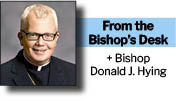
I recently had the privilege of meeting with Dr. Robert Enright, who is a professor of psychology at UW-Madison.
He has spent his career teaching, writing, and speaking about the necessity and power of forgiveness.
He is the author of 80 publications, and his work has appeared in many media outlets.
Presenting his thoughts all over the world to thousands of people, he is a modern prophet of forgiveness in a world that desperately needs it.
Bringing us back
We all know that reconciliation and forgiveness lie at the heart of the Gospel.
Jesus came to seek out and save what was lost, namely broken humanity, and to reconcile us to the Father and to one another.
The whole meaning of the Paschal Mystery is God’s work of bringing us back into right relationship.
“But now in Christ Jesus, you who once were far off have been brought near in the blood of Christ. For he is our peace, who has made both one and has broken down the dividing wall of hostility . . . so making peace, and might reconcile both to God in one body through the cross, thereby bringing the hostility to an end.” (Ephesians 2: 13-16)
In one way or another, all of us have suffered hurt, betrayal, and an absence of love, feeling the pain of broken relationships.
All of us as well have hurt others, intentionally or not, inflicting pain, most often on those we love the most.
Because we are fallen human beings, these dynamics are seemingly built into our DNA.
Even in the best of marriages or friendships, disappointments and frustrations lead to a suffering of the heart and sometimes a resentment that can fester and corrode our love for another.
The only solution to joy and freedom is the power of forgiveness!
We follow a Master who preached love of one’s enemies, exhorted us to go an extra mile, and to surrender to the healing power of His mercy.
The Lord acted out these words so profoundly when He spoke from the cross, “Father, forgive them; for they know not what they do.” (Luke 23: 34)
For Jesus to look, not only with love but also understanding upon those who were cruelly crucifying Him and mocking Him as they did so, is a forgiveness that transcends merely human possibility.
The Lord loves us, even in our sin, and offers His life on the cross to free us from the power of evil.
His mercy is the precious fruit of His Passion, death, and resurrection.
A gift from God
On Easter Sunday night, Christ appears to the Apostles in the Upper Room, wishing them peace, breathing the Holy Spirit on them, and empowering them to proclaim the forgiveness of sins, as if He cannot wait to come back from the dead in order to share the fruit of the divine victory over the power of hatred and sin.
The Sacrament of Reconciliation is the Lord’s precious gift to us, whereby we can lay down the burden of our sins and receive the fullness of God’s forgiveness — a full restoration of our Baptismal innocence and grace.
I encourage all Catholics to confess their sins at least once a month. Such a practice will change your life.
All of us have experienced betrayal, hurt, and wounds so deep from others that we may often feel we can never forgive.
In such moments, I begin by praying for the grace to want to forgive. “Lord, I can’t forgive this person right now, but please help me to desire to do so.”
Prayed often enough, this simple request to God gains me sufficient grace to eventually move forward.
Another practice that helps me is to picture the person I am struggling to forgive standing beneath the cross and the Lord looking down on that person with great love.
That imagining reminds me that Jesus loves the one I am currently angry at as much as He loves me, and so I seek to repeat the words He uttered from the cross.
In so many painful ways, our world, country, communities, and perhaps families are being ripped apart by a lack of forgiveness, an inability to seek reconciliation, and a deep anger that segregates people into tribes and islands.
The only solution to the toxic hatred, profound disrespect, and lack of love both in and around us is the overflowing mercy of Jesus Christ. Only He can heal this dark and broken world.
The more we encounter His reconciling and unconditional love for us, the more we can both forgive and ask for forgiveness.
So many of the saints who died as martyrs forgave their killers and executioners, thus imitating the Lord in His sacred Passion and showing us the path to freedom and peace.
We cannot control how people act toward us but we can control how we respond.
By word, example, and grace, Jesus shows us the way to reconcile and heal the terrible fractures of the human heart.
Only in the Cross can we embrace His overflowing mercy.

